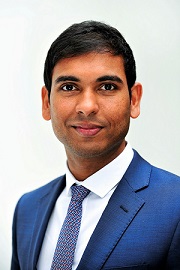Sankar Sivarajah, Head of the School of Management at the University of Bradford, outlines the School’s community connections and outlook on widening access to quality management education. Interview by Tim Banerjee Dhoul
When he isn’t pursuing agritech research with the potential to transform farming, or teaching students the distinction between ‘circularity’ and ‘sustainability’, Sankar Sivarajah is excited by his institution’s ‘ambitious’ five-year strategy and its ‘bold actions… to empower change’: ‘We want to continue to focus on supporting economic and social regeneration,
suited to the real-life challenges of society by supporting non-traditional students’ engagement with local, regional and international businesses and communities,’ says Sivarajah, Head of the School of Management at the University of Bradford, UK.
In this interview, Sivarajah tells Business Impact about the ways in which his School connects with its community – something he believes is critical to a Business School’s role in stimulating social and economic growth. He also details the approach towards inclusivity taken by the School’s online MBA and its commitment to fostering a thriving learning environment for students from underrepresented segments of society.
How has Covid-19 changed the demand for, and availability of, business education and what further changes should we expect to see in this year?
Without a shadow of a doubt, Business Schools in the UK and across the world have had to rapidly adapt and respond to the changing needs of learners, employers and governments in the current uncertain and evolving landscape. I am certain that there is a long list of changes on every Business School’s agenda, be it of redesigning and enhancing curricula and programme offers, developing staff capacity and capabilities, or even rethinking their business model and strategy.
Business Schools will need to give serious thought to their own business model and build in agility, readiness and scalability to cope with fluctuations in business education uptake. Business Schools will also need to continue to evolve and meet the flexible demands of the new generations of learners. Most importantly, the role of Business Schools in delivering social and economic value is more important than ever to maintain their place in society.
What do you think makes your portfolio of programmes stand out from others that are available in the UK and Europe?
Our programmes are co-designed with extensive consultation and direct input from a range of stakeholders including existing and potential students, industry partners (e.g. Morrisons, IBM and Coca-Cola), alumni, School advisory boards, employers and academics.
An example of our programme innovation is the recent conversion master’s programme in applied artificial intelligence and data analytics which received £700,000 GBP in scholarship and programme design funding from [UK public and governmental bodies, including] the Office for Students, the Department for Culture, Media and Sport (DCMS), and the Office for Artificial Intelligence, as well as from industry contributions in the UK.
Our programmes stand out by integrating skills development opportunities where possible to allow for attaining microcredentials (from, for example, the Project Management Institute, Amazon AWS Academy, or SAS certification) through the School’s unique Career Booster (CB) Employability programme. The CB programme consists of two, week-long sessions every academic year consisting of more than 60 skills-based workshops and masterclasses that are offered free. These are delivered by sector experts, our industry partners, guest speakers and alumni to boost our student’s employability, networking and enterprise skills.
Your School is placing emphasis on making management education more inclusive and accessible. Why is this an area of importance and what do you hope to achieve from your current initiatives?
We have, from the outset, always been known for our progressive approach to business education. We are the first Business School in England to receive joint accreditation from AMBA & BGA, and the second in the UK. This achievement signifies our ambition in delivering impact and value creation for students, businesses and communities alike with a focus on responsible management which is inclusive and accessible.
Our flagship Distance Learning MBA (DL MBA) programme is our exemplar of making management education inclusive and accessible and was ranked – for the second year running – as first in the world for ‘value for money’ in 2020’s online MBA rankings from the Financial Times. While we maintain high standards of recruitment, we aim to ensure that financial considerations are not a barrier to individuals who wish to engage in management studies, and this is reflected in the course fees, and students’ ability to pay in instalments over a two-year period. The online and flexible model of the DL MBA has attracted and provided access to learners from 99 nationalities across the globe from Barbados to Australia. We want to continue to develop and ensure that we provide quality responsible management education that is affordable and accessible by everyone.
Do Business Schools need to do more to address social inequality and provide opportunities for social mobility?
Absolutely. Business Schools have become widely recognised for the role that they play in stimulating social and economic growth. Key within many of these roles are ways in which Business Schools connect with the community and co-exist to address socioeconomic inequality and promote social mobility. Hence, equality, diversity and inclusion should be at the heart of every Business School, and it is certainly in our ethos, as is reflected by the wider University of Bradford being recognised as the 2020 University of the Year for Social Inclusion by Times Higher Education. Some of the School’s commitment has been centred around creating an inclusive and thriving learning environment for our students, as almost 85% of our undergraduate students come from the most socioeconomically deprived areas by postcode, as defined by POLAR 1-3 [a UK initiative measuring participation in higher education by local area] and around 70% are from BAME backgrounds, with many being first-generation university attendees.
How are faculty members involved in the School’s Community Career Booster Programme and how do you think they benefit from their involvement?
The Community Career Booster (CCB) Programme is a free programme that is open to all, including charities, community groups, faith groups, voluntary organisations and parents’ groups. The programme aims to enrich people’s lives in Bradford by providing accessible learning opportunities to the local community through a diverse range of skills enrichment workshops provided by the School’s academic staff on various topics, such as SAGE 50 accounting, Making Tax Digital and Microsoft Word and Excel training.
This ‘Certificate of Learning’ awarding programme benefits communities by boosting personal development, skills, confidence and CVs, thus enhancing technical skills while making a difference to the organisation or community group they are working within or support. The faculty members benefit from these initiatives as it provides them with a development opportunity (especially early-career staff) to engage with local businesses and community stakeholders to build partnerships and work together in addressing real-world business needs. In some cases, these relationships and connections with practice evolve into successful research projects that produce a societal impact where both our researchers and business community mutually benefit.
Aside from its potential for impact in the community, in your opinion, how does the School’s Knowledge Transfer Network (KTN) benefit the School?
The School prioritises growing engagement with small business and entrepreneurs. In support of this, we provide a number of activities and programmes, including the Knowledge Transfer Network (KTN) programme. Supported by Barclays UK, the KTN is an established, open and free-to-access community of SMEs that act to support each other and work collaboratively with the School of Management and across the University.
The network has impacted on more than 5,000 SMEs over its lifecycle and has a current membership of well over 1,500 SMEs. Through this, we have offered networking seminars and events for around 3,000 businesses in Bradford for more than 15 years. During the Covid period, we have continued to deliver the KTN through a series of virtual facilitated events. Due to its participant’s mix – i.e. representatives from local businesses, public organisations, and third sector organisations, as well as academics, students and alumni, KTN provides a solid networking platform. KTN members have acted as mentors and role models for our students and is a source for industry consultation. Together with its local project and placement opportunities, this makes the KTN key to supporting the success of our students.
Which single new programme, course, or initiative are you most excited about and why?
What excites me is the delivery of the School’s ambitious five-year strategy (2020-25) which sets out bold actions to use our responsible management education, distinctive and relevant research and partnerships to empower change. The strategy has been developed and built incorporating inputs from staff, students, international and industry advisory boards, community groups, and organisations that we work with, embedding recommendations from our triple-crown accreditation bodies (AACSB, AMBA, EQUIS) and our commitment to UN PRME principles.
As a School, we want to continue to focus on supporting economic and social regeneration, suited to the real-life challenges of society by supporting non-traditional students’ engagement with local, regional and international businesses and communities. Our planned efforts and developments will therefore focus on opening up the value of the School for more people; scale business and community engagement initiatives; provide more diverse, work-ready talent for both small businesses and large organisations, bridge the skills gap and enable businesses in the region and globally to access university resources and thereby support their growth.
Your research is said to concentrate largely on the use of emerging digital technology for the betterment of society. Can you tell me a bit about one of your current or recent projects in this area?
A recent project of mine with fellow researchers has been on developing a concept of ‘drone swarms’, airborne AI units capable of quickly gathering masses of information about crops, soil temperature, moisture levels and the use of pesticides which have the potential to transform farming, increase yields and make production more efficient.
The research project has recently been published in Production Planning and Control Journal and has applications in places where there is a need for farmers to explore vast areas of inaccessible land. We have conceptualised the idea and the next step is to simulate and test the real thing. Agritech and food security is a huge area, both in the UK and across the world. As AI grows, this will become much more important. Emerging technologies act as an enabler for most organisations which can end up being used for good or bad, so I believe it’s important to use it in the right way and for the betterment of society.
Your teaching at MBA level includes the circular economy. What do tomorrow’s business managers and owners need to know and understand about the circular economy?
One thing I always highlight to our executives is to first get to grips with the fundamentals of the circular economy and its principles and not to misinterpret it with various [aspects of the] sustainability agenda. Unfortunately, the terms ‘circularity’ and ‘sustainability’ are used together and somewhat interchangeably, which dilutes the importance and action related to either one.
Our current and future business managers, owners and leaders need to be in a position to challenge the norm and move away from the linear industrial economy practices of make, use and dispose. The principles of circular economy as a framework equips them to do exactly that and enables them to rethink our industrial economy by design or intention. Innovation and enterprise lie at the heart of the circular economy where harnessing new ideas, modernising old ideas and shifting to circular models for value creation, retention and recovery is a must for today’s business managers and owners, not just tomorrow’s.
Sankar Sivarajah is Head of the School of Management and a Professor of Technology Management and Circular Economy at the University of Bradford, UK.
This article is taken from Business Impact’s print magazine (edition: February-April 2021).





























